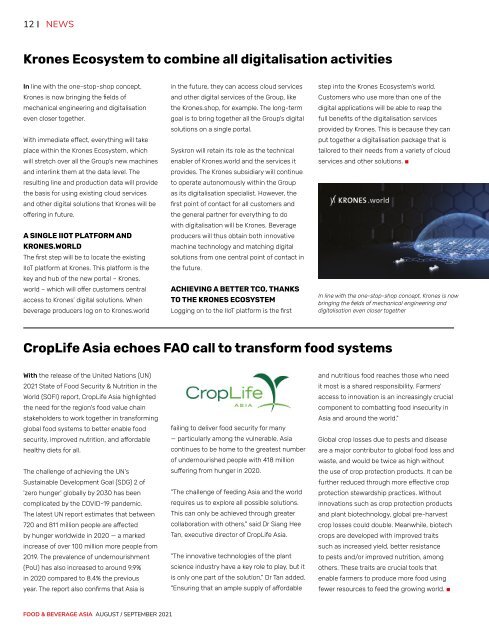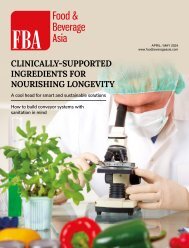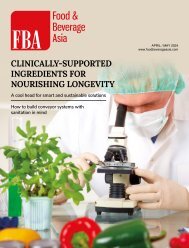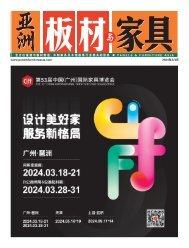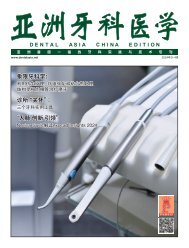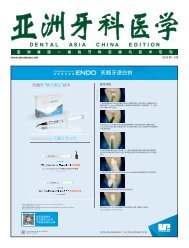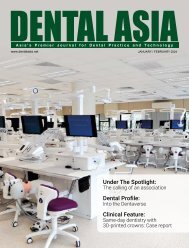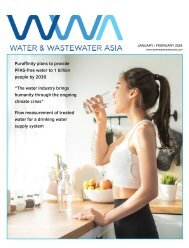Food & Beverage Asia August/September 2021
Food & Beverage Asia (FBA) is the leading source of food and beverage news in Asia since 2002. FBA delivers a comprehensive view of the food and beverage landscape, spanning across the latest health and nutrition trends and industry innovations in ingredients, recipe formulations, food science, sustainability, packaging, and automation, as well as advancements in agri and food-tech.
Food & Beverage Asia (FBA) is the leading source of food and beverage news in Asia since 2002. FBA delivers a comprehensive view of the food and beverage landscape, spanning across the latest health and nutrition trends and industry innovations in ingredients, recipe formulations, food science, sustainability, packaging, and automation, as well as advancements in agri and food-tech.
Create successful ePaper yourself
Turn your PDF publications into a flip-book with our unique Google optimized e-Paper software.
12<br />
NEWS<br />
Krones Ecosystem to combine all digitalisation activities<br />
In line with the one-stop-shop concept,<br />
Krones is now bringing the fields of<br />
mechanical engineering and digitalisation<br />
even closer together.<br />
With immediate effect, everything will take<br />
place within the Krones Ecosystem, which<br />
will stretch over all the Group’s new machines<br />
and interlink them at the data level. The<br />
resulting line and production data will provide<br />
the basis for using existing cloud services<br />
and other digital solutions that Krones will be<br />
offering in future.<br />
A SINGLE IIOT PLATFORM AND<br />
KRONES.WORLD<br />
The first step will be to locate the existing<br />
IIoT platform at Krones. This platform is the<br />
key and hub of the new portal – Krones.<br />
world – which will offer customers central<br />
access to Krones’ digital solutions. When<br />
beverage producers log on to Krones.world<br />
in the future, they can access cloud services<br />
and other digital services of the Group, like<br />
the Krones.shop, for example. The long-term<br />
goal is to bring together all the Group’s digital<br />
solutions on a single portal.<br />
Syskron will retain its role as the technical<br />
enabler of Krones.world and the services it<br />
provides. The Krones subsidiary will continue<br />
to operate autonomously within the Group<br />
as its digitalisation specialist. However, the<br />
first point of contact for all customers and<br />
the general partner for everything to do<br />
with digitalisation will be Krones. <strong>Beverage</strong><br />
producers will thus obtain both innovative<br />
machine technology and matching digital<br />
solutions from one central point of contact in<br />
the future.<br />
ACHIEVING A BETTER TCO, THANKS<br />
TO THE KRONES ECOSYSTEM<br />
Logging on to the IIoT platform is the first<br />
step into the Krones Ecosystem’s world.<br />
Customers who use more than one of the<br />
digital applications will be able to reap the<br />
full benefits of the digitalisation services<br />
provided by Krones. This is because they can<br />
put together a digitalisation package that is<br />
tailored to their needs from a variety of cloud<br />
services and other solutions. ■<br />
In line with the one-stop-shop concept, Krones is now<br />
bringing the fields of mechanical engineering and<br />
digitalisation even closer together<br />
CropLife <strong>Asia</strong> echoes FAO call to transform food systems<br />
With the release of the United Nations (UN)<br />
<strong>2021</strong> State of <strong>Food</strong> Security & Nutrition in the<br />
World (SOFI) report, CropLife <strong>Asia</strong> highlighted<br />
the need for the region's food value chain<br />
stakeholders to work together in transforming<br />
global food systems to better enable food<br />
security, improved nutrition, and affordable<br />
healthy diets for all.<br />
The challenge of achieving the UN's<br />
Sustainable Development Goal (SDG) 2 of<br />
'zero hunger' globally by 2030 has been<br />
complicated by the COVID-19 pandemic.<br />
The latest UN report estimates that between<br />
720 and 811 million people are affected<br />
by hunger worldwide in 2020 — a marked<br />
increase of over 100 million more people from<br />
2019. The prevalence of undernourishment<br />
(PoU) has also increased to around 9.9%<br />
in 2020 compared to 8.4% the previous<br />
year. The report also confirms that <strong>Asia</strong> is<br />
failing to deliver food security for many<br />
— particularly among the vulnerable. <strong>Asia</strong><br />
continues to be home to the greatest number<br />
of undernourished people with 418 million<br />
suffering from hunger in 2020.<br />
"The challenge of feeding <strong>Asia</strong> and the world<br />
requires us to explore all possible solutions.<br />
This can only be achieved through greater<br />
collaboration with others," said Dr Siang Hee<br />
Tan, executive director of CropLife <strong>Asia</strong>.<br />
"The innovative technologies of the plant<br />
science industry have a key role to play, but it<br />
is only one part of the solution," Dr Tan added.<br />
"Ensuring that an ample supply of affordable<br />
and nutritious food reaches those who need<br />
it most is a shared responsibility. Farmers'<br />
access to innovation is an increasingly crucial<br />
component to combatting food insecurity in<br />
<strong>Asia</strong> and around the world."<br />
Global crop losses due to pests and disease<br />
are a major contributor to global food loss and<br />
waste, and would be twice as high without<br />
the use of crop protection products. It can be<br />
further reduced through more effective crop<br />
protection stewardship practices. Without<br />
innovations such as crop protection products<br />
and plant biotechnology, global pre-harvest<br />
crop losses could double. Meanwhile, biotech<br />
crops are developed with improved traits<br />
such as increased yield, better resistance<br />
to pests and/or improved nutrition, among<br />
others. These traits are crucial tools that<br />
enable farmers to produce more food using<br />
fewer resources to feed the growing world. ■<br />
FOOD & BEVERAGE ASIA AUGUST / SEPTEMBER <strong>2021</strong>


